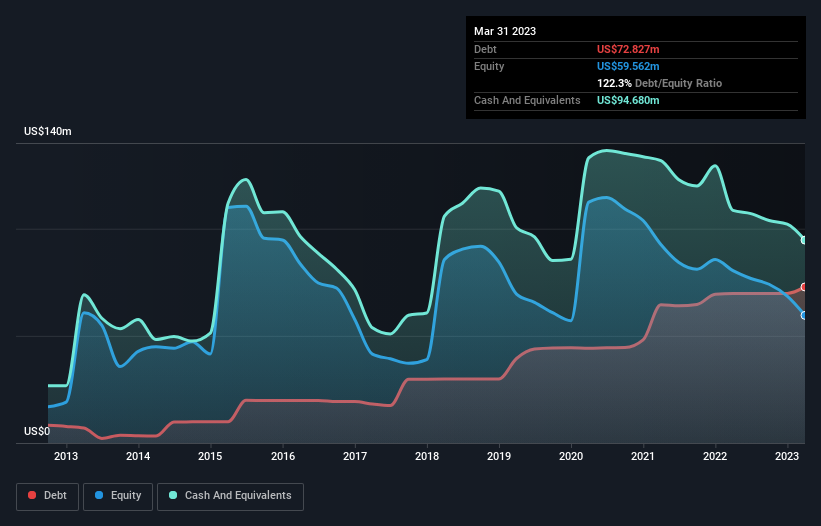
David Iben put it well when he said, 'Volatility is not a risk we care about. What we care about is avoiding the permanent loss of capital.' So it might be obvious that you need to consider debt, when you think about how risky any given stock is, because too much debt can sink a company. Importantly, Cerus Corporation (NASDAQ:CERS) does carry debt. But is this debt a concern to shareholders?
When Is Debt A Problem?
Debt is a tool to help businesses grow, but if a business is incapable of paying off its lenders, then it exists at their mercy. Part and parcel of capitalism is the process of 'creative destruction' where failed businesses are mercilessly liquidated by their bankers. However, a more common (but still painful) scenario is that it has to raise new equity capital at a low price, thus permanently diluting shareholders. Of course, plenty of companies use debt to fund growth, without any negative consequences. When we examine debt levels, we first consider both cash and debt levels, together.
View our latest analysis for Cerus
What Is Cerus's Net Debt?
As you can see below, at the end of March 2023, Cerus had US$72.8m of debt, up from US$69.8m a year ago. Click the image for more detail. However, it does have US$94.7m in cash offsetting this, leading to net cash of US$21.9m.

A Look At Cerus' Liabilities
We can see from the most recent balance sheet that Cerus had liabilities of US$77.6m falling due within a year, and liabilities of US$72.2m due beyond that. Offsetting these obligations, it had cash of US$94.7m as well as receivables valued at US$26.8m due within 12 months. So its liabilities total US$28.3m more than the combination of its cash and short-term receivables.
Since publicly traded Cerus shares are worth a total of US$371.9m, it seems unlikely that this level of liabilities would be a major threat. But there are sufficient liabilities that we would certainly recommend shareholders continue to monitor the balance sheet, going forward. Despite its noteworthy liabilities, Cerus boasts net cash, so it's fair to say it does not have a heavy debt load! There's no doubt that we learn most about debt from the balance sheet. But ultimately the future profitability of the business will decide if Cerus can strengthen its balance sheet over time. So if you're focused on the future you can check out this free report showing analyst profit forecasts.
In the last year Cerus wasn't profitable at an EBIT level, but managed to grow its revenue by 7.4%, to US$156m. That rate of growth is a bit slow for our taste, but it takes all types to make a world.
So How Risky Is Cerus?
By their very nature companies that are losing money are more risky than those with a long history of profitability. And we do note that Cerus had an earnings before interest and tax (EBIT) loss, over the last year. Indeed, in that time it burnt through US$16m of cash and made a loss of US$46m. But at least it has US$21.9m on the balance sheet to spend on growth, near-term. Summing up, we're a little skeptical of this one, as it seems fairly risky in the absence of free cashflow. There's no doubt that we learn most about debt from the balance sheet. But ultimately, every company can contain risks that exist outside of the balance sheet. For instance, we've identified 2 warning signs for Cerus that you should be aware of.
When all is said and done, sometimes its easier to focus on companies that don't even need debt. Readers can access a list of growth stocks with zero net debt 100% free, right now.
New: AI Stock Screener & Alerts
Our new AI Stock Screener scans the market every day to uncover opportunities.
• Dividend Powerhouses (3%+ Yield)
• Undervalued Small Caps with Insider Buying
• High growth Tech and AI Companies
Or build your own from over 50 metrics.
Have feedback on this article? Concerned about the content? Get in touch with us directly. Alternatively, email editorial-team (at) simplywallst.com.
This article by Simply Wall St is general in nature. We provide commentary based on historical data and analyst forecasts only using an unbiased methodology and our articles are not intended to be financial advice. It does not constitute a recommendation to buy or sell any stock, and does not take account of your objectives, or your financial situation. We aim to bring you long-term focused analysis driven by fundamental data. Note that our analysis may not factor in the latest price-sensitive company announcements or qualitative material. Simply Wall St has no position in any stocks mentioned.
About NasdaqGM:CERS
Excellent balance sheet and fair value.
Similar Companies
Market Insights
Community Narratives



